ABSTRACT
In 2009, an ADB funded survey found that 85% of Ha Noi consumers did not believe in safe vegetables certification by local agricultural government, the official certification body. In the mean time, the demand of safe vegetables is strongly increasing due to the overuse of growth regulators and pesticides. The project of PGS organic vegetables production and marketing was launched in 2008 in the hope of helping small farmers to produce high quality vegetables and to meet the market trend. However, the high cost of producing organic vegetables vs. weak marketing capacity had resulted in the failure of production groups. The paper will reveal the lessons learned by the project which worked seriously with production and big supermarkets. Many groups were established in a short time and quickly left their farms idle due to lack of markets. Fortunately, with high demand and creative marketing strategies by the project to inspire young agri-entrepreneurs, the sale of organic vegetables has been gradually increasing. This paper will present in detail the project approaches to work directly with farmer groups and agri-businesses to keep the farms under strict control, helping make our marketing effective. This paper will discuss why the consumers trust PGS products and young agri-entrepreneurs can maintain direct and good relationship with the consumers, with almost no cost. Particularly the paper highlights the rise of local young entrepreneurs as a key ingredient to the success of the project. Therefore the PGS Network of all organic PGS stakeholders could run independently and continue growing with practically no funds at all for the last six years. Currently, around 400 farmers have benefited from the Network and supply of 700 tons of organic vegetables to Ha Noi.
Keywords: Young farmers, agricultural entrepreneurs, organic vegetables
Background of the project
In Vietnam, many activities have been implemented to promote food safety and certification. Costs associated with certification by third party are generally expensive and prohibitive for small-scale producers; additionally third party certification system in Vietnam is not reliable in the consumer’s eyes. To overcome costly food certification and increase the trust, a low cost alternative food safety guarantee system called Participatory Guarantee System (PGS) in Viet Nam was developed by ADDA in 2007. The PGS is able to lower the certification costs by allowing farmer groups and other stakeholders to certify their produce following an agreed set of standards. When this PGS becomes prevalent and more small-scale producers and stakeholders join in, consumers will greatly benefit from having food produced with high safety standards and friendly to the environment at a lower price.
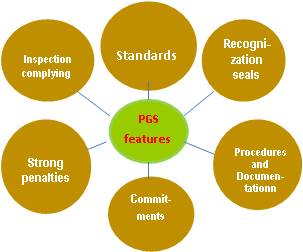
Description of the PGS
PGS is a quality guarantee system with the participation of stakeholders who are involved in organic products chain including producers, consumers, traders, government agency, local authorities and NGOs
- PGS is non-hierarchical. Each unit is empowered and take responsibility for its own activities
- Participation is an essential and dynamic of PGS.Cross-check carried out by producers who are responsible for their own decisions
- PGS is transparent on decision making process. Everyone is able to access PGS database as well as organize farm tours for consumers to learn organic farming that they are consuming its products.
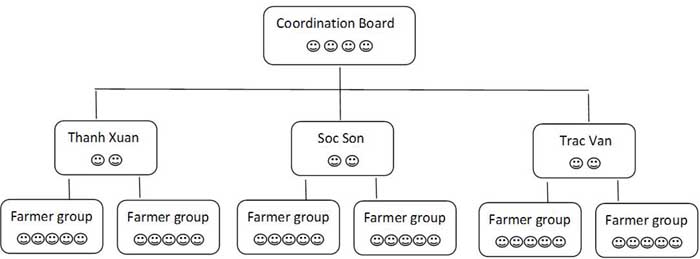
Peer review and certification process in PGS
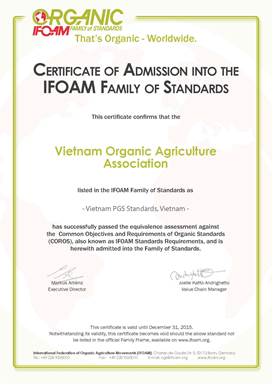
- PGS is community certification which has process and methods as same as independent certification systems undertaken by the Third parties
- Inter-group where links producer groups at the local, planning and coordinating 2 inspections/year, assigning randomly cross check the groups belong to
- Inspectors are the PGS farmers who have been properly trained on inspection. They will carry out the visits according to assignment ofinter-group
- Inter-group members make certification decision based on inspection report. They have the right to punish groups who are not complying with the standards
- PGS.CC (PGS Coordination Committee) will verify and issue certificates based on decision sent from inter-groups
- PGS.CC has the right to decline issue certificate when inter-group show up non-transparent and take action on noncomplianceaccording to PGS regulation
- Currently in Vietnam, only PGS is a system certify for organic products for local and domestic markets
- Today, PGS standards is the first and the only Vietnamese Organic standard officially recognized by IFOAM – the most prestigious International organic organization
- PGS is built on Trust, Transparent and Participation of all stakeholders who involve for monitoring and guarantee organic quality
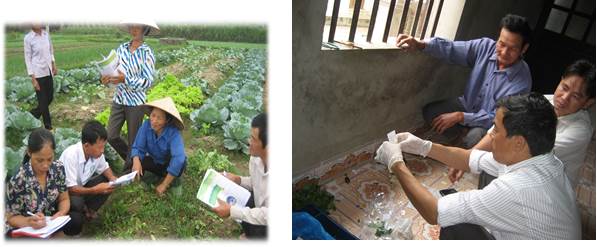
Outcomes of PGS organic in Vietnam
- Three systems, one in the north (PGS Vietnam), one in the central region (PGS Hoi An), and one in Ben Tre with majority in vegetable
- Four intergroups in PGS Vietnam including Thanh Xuan, Luong Son, Trac Van and Tan Lac
- 400 members with 41ha and 650 tons of vegetable/year (2017)
- PGS is the only organic system being trusted within the country thanks to its serious inspection and certification and penalty
- Many more small stores of organic foods are being opened
Recent emerging activities by PGS organic in Vietnam
- PGS coordination board is invited to contribute to organic standards by MARD and related organizations
- Consumers are active volunteers in market inspection
- PGS participates in CASPII by MARD and ADB, a project of replicating organic farms
- Promotion activities have been conducted through agroviet fairs, national and international workshops, internet, clips and newspapers
- QR code is being applied for better traceability
- Hundreds of healthy foods stores have been opened recently with founders as young businessmen inspired by organic farming
- Many farmer groups have evolved to more official businesses such as cooperatives and companies owned by young and local people
Key lessons
- The objective of market access of organic foods for Hanoi is new but fashionable in the time of the project and in the long term
- Quality control had been considered the most important from the very beginning
- Trainings plus inspection are the two strong tools for empowering small farmers to become responsible and capable of high quality produce
- The project employed marketing since the had started for 2 years by inviting a marketing consultant (Fresh Studio) to work for the project: A couple of businesses willing to participate in the project, a detail marketing plan was conducted for the public and for partnership businesses
- Young entrepreneurs have been strongly inspired by healthy foods under the right marketing of the project. This is the leading factor for the success
- Farm tours are of high interest from consumers, particularly in the case of low trust in the market
- Farm schools for kindergarten and primary students are very exciting and attracting a lot of consumers
- Tourists are interested in organic farming and willing to pay for visiting the farm
- Social networks such as Facebook are playing more important for small entrepreneurs whose are limited in finance
- Field engineers for inspecting and advising farmers regularly
- Strong supported by the government in recognizing the standards and certification system
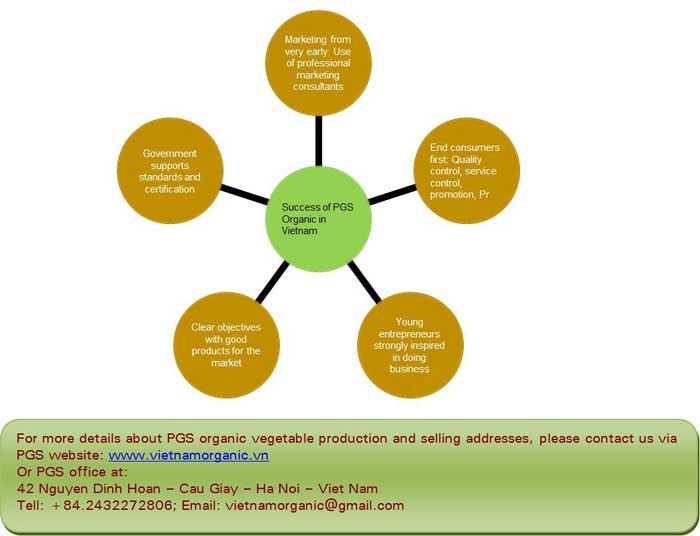
The case of Bac Tom, a young entrepreneur of organic products in Vietnam
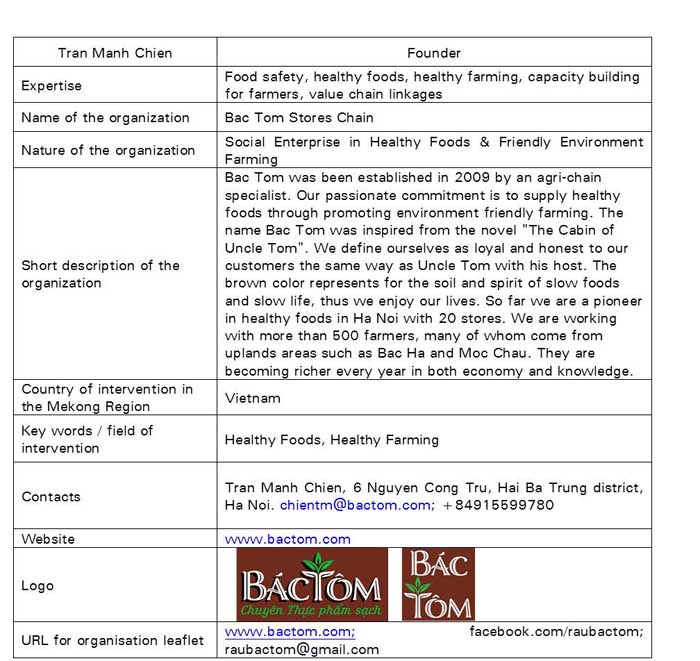
|
Date submitted: Oct. 1, 2018
Reviewed, edited and uploaded: Oct. 25, 2018
|


PGS Organic Vegetables in Ha Noi: Engaging Young and Local Agri-Entrepreneurs
ABSTRACT
In 2009, an ADB funded survey found that 85% of Ha Noi consumers did not believe in safe vegetables certification by local agricultural government, the official certification body. In the mean time, the demand of safe vegetables is strongly increasing due to the overuse of growth regulators and pesticides. The project of PGS organic vegetables production and marketing was launched in 2008 in the hope of helping small farmers to produce high quality vegetables and to meet the market trend. However, the high cost of producing organic vegetables vs. weak marketing capacity had resulted in the failure of production groups. The paper will reveal the lessons learned by the project which worked seriously with production and big supermarkets. Many groups were established in a short time and quickly left their farms idle due to lack of markets. Fortunately, with high demand and creative marketing strategies by the project to inspire young agri-entrepreneurs, the sale of organic vegetables has been gradually increasing. This paper will present in detail the project approaches to work directly with farmer groups and agri-businesses to keep the farms under strict control, helping make our marketing effective. This paper will discuss why the consumers trust PGS products and young agri-entrepreneurs can maintain direct and good relationship with the consumers, with almost no cost. Particularly the paper highlights the rise of local young entrepreneurs as a key ingredient to the success of the project. Therefore the PGS Network of all organic PGS stakeholders could run independently and continue growing with practically no funds at all for the last six years. Currently, around 400 farmers have benefited from the Network and supply of 700 tons of organic vegetables to Ha Noi.
Keywords: Young farmers, agricultural entrepreneurs, organic vegetables
Background of the project
In Vietnam, many activities have been implemented to promote food safety and certification. Costs associated with certification by third party are generally expensive and prohibitive for small-scale producers; additionally third party certification system in Vietnam is not reliable in the consumer’s eyes. To overcome costly food certification and increase the trust, a low cost alternative food safety guarantee system called Participatory Guarantee System (PGS) in Viet Nam was developed by ADDA in 2007. The PGS is able to lower the certification costs by allowing farmer groups and other stakeholders to certify their produce following an agreed set of standards. When this PGS becomes prevalent and more small-scale producers and stakeholders join in, consumers will greatly benefit from having food produced with high safety standards and friendly to the environment at a lower price.
Description of the PGS
PGS is a quality guarantee system with the participation of stakeholders who are involved in organic products chain including producers, consumers, traders, government agency, local authorities and NGOs
Peer review and certification process in PGS
Outcomes of PGS organic in Vietnam
Recent emerging activities by PGS organic in Vietnam
Key lessons
The case of Bac Tom, a young entrepreneur of organic products in Vietnam
Date submitted: Oct. 1, 2018
Reviewed, edited and uploaded: Oct. 25, 2018